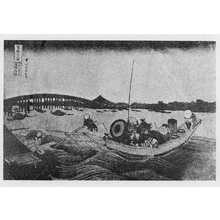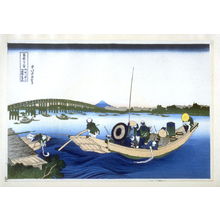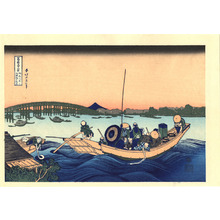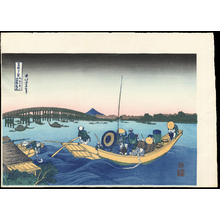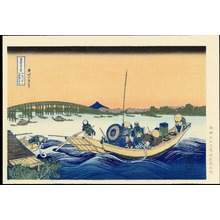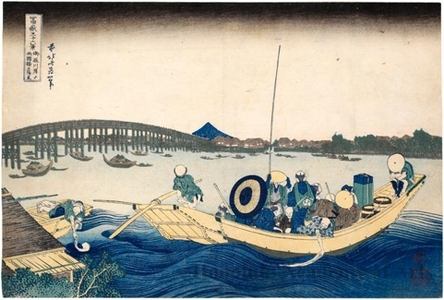葛飾北斎による浮世絵「Viewing Sunset over the Ryögoku Bridge from the Ommaya Embankment」
作者:葛飾北斎
作品名:Viewing Sunset over the Ryögoku Bridge from the Ommaya Embankment
制作年:c. 1830 - 1834
詳細:詳細情報...
情報源:ホノルル美術館
浮世絵(全 5,476 件)を表示...
説明:
Hokusai presents a seemingly artless scene that forms, at the same time, a striking visual composition. In the approaching dusk, a ferryboat gradually moves on the gentle waves of the Sumida River. The ferryman and passengers seem to symbolize the spectrum of life in the city of Edo. Apart from the group, a man sits in solitude in the bow of the boat. His practical moss-green cotton kimono with white small shibori or kasuri patterns drapes loosely over his tied body. The kimono is short, its hem probably tucked into his sash at the back for walking. Tight indigo-blue leggings and straw sandals suggest that he has made a long and tiring journey. A samurai leans against the gunwale of the boat while he lifts his hat to gaze at Mount Fuji. Two swords emerge from his semiformal brown haori, which is decorated with a small family crest on the back. Seated in front of him, a blind masseur (amma) wearing a draped brown haori leans forward on his cane. Next to him a raffish-looking townsman is dressed in white, summery yukata dyed with large star designs. Standing at the center of the group is a merchant, whose indigo-dyed cotton kimono falls, straight and severe, to his ankles. On his back is slung a bundle-perhaps of merchandise-wrapped in a green furoshiki. Seated next to the clerk, a townsman, probably an affluent merchant, dressed in blue, converses with another townsman. On the opposite side of the boat, a man dressed in a striped kimono and green haori adjusts his straw hat while holding an upright bamboo pole. The ferryman stands in the stern, looking at Mount Fuji while sculling the boat. In order to free his arms and legs for movement, his sleeves are gathered at the shoulders, while his cotton kasuri kimono is tucked up at the waist to reveal his traditional narrow white loincloth (fundoshi ). (from “Blue and White” textiles exhibition 8/28/2008-) - - - - - - - - - The Ommaya Embankment was a landing for a ferry crossing between the Ryögoku and Ökawa bridges, which spanned the Sumida River in Edo. In this print, the long arc of the Ryögoku Bridge is seen from a point near the Ommaya embarkation point. In Hokusai’s time, the Ryögoku Bridge and its vicinity served as a gathering place where, for example, people would crowd to view fireworks during the summer festival. This custom still continues today. In the Edo period, a network of large rivers, such as the Sumida and many subsidiary rivers as well as canals, provided convenient public transportation. For a minimum fee, passengers rode a ferry to a landing nearest to their destination. Ferries carried all sorts of people, who arrived from all directions. On this ferry some passengers chat, while another sits in deep contemplation, and one man leans on the gunwale to wash his towel. A woman in another boat also washes her towel. Most of the people are indifferent to the beauty of Mount Fuji, seen dark blue against the red sunset sky. Hokusai, well known for his masterful treatment of water and waves, skillfully expresses the rolling current of the river, which makes the ferry pitch. Hokusai’s ingenious design ability is observed in the bird-catcher’s long, birdlime-coated pole. This pole, rising high against the empty sky, enlivens a horizontal composition that would have been a bit dull without it. The key-block was printed in blue. (The Asian Art Museum of San Francisco, HOKUSAI AND HIROSHIGE – Great Japanese Prints from the James A. Michener Collection, Honolulu Academy of Arts: The Asian Art Museum of San Francisco, 1998 Page 76. Cat. 27) ***************** Ryögoku Bridge was the most famous of several large bridges across the Sumida River. At several points between the Sumida bridges there were ferry crossings, and Onmaya Bank was a landing for one of these. The curve of the bridge is reflected in the curve of the ferry, while the dark blue triangle depicting Mount Fuji recalls the blue of the waves under the boat. The blackened sky suggests a summer shower of rain, as does an umbrella on the ferry, decorated in the dominant color scheme of blue and yellow. One of the men leans over the side of the boat, trailing a towel in playful imitation of the woman doing her washing to the left. Behind him, another man carrying a bundle on his back stands to admire the volcano; the bundle bears the store mark of Nishimura Eijudö, the publisher of this print series. “Hokusai’s Summit: Thirty-six Views of Mount Fuji” (09/24/2009-01/06/2010) ******************************
類似の浮世絵
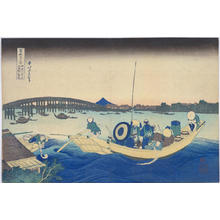
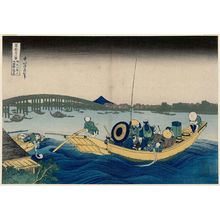
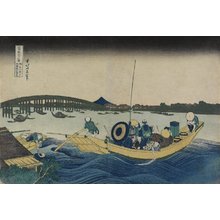
![Ommaya-gashi yori Ryogoku-bashi no sekiyo o miru 御厩川岸ヨリ両國橋夕陽見 (Viewing Sunset over Ryogoku Bridge from the Ommaya Embankment [Edo]) / Fugaku sanju-rokkei 冨嶽三十六景 (Thirty-Six Views of Mt Fuji) Katsushika Hokusai, 葛飾北斎 (Katsushika Hokusai (葛飾北斎))による浮世絵「Ommaya-gashi yori Ryogoku-bashi no sekiyo o miru 御厩川岸ヨリ両國橋夕陽見 (Viewing Sunset over Ryogoku Bridge from the Ommaya Embankment [Edo]) / Fugaku sanju-rokkei 冨嶽三十六景 (Thirty-Six Views of Mt Fuji)」](https://data.ukiyo-e.org/bm/thumbs/AN00337796_001_l.jpg)
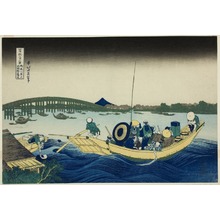
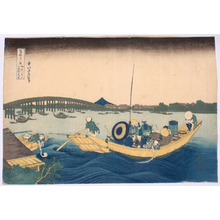
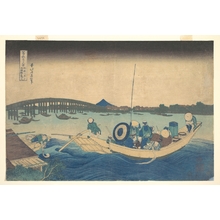
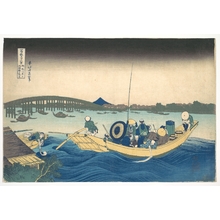

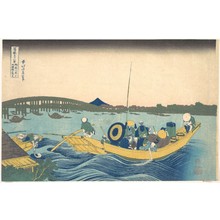
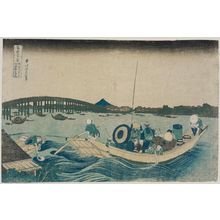
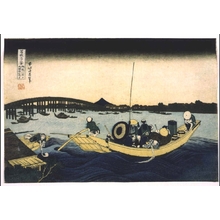
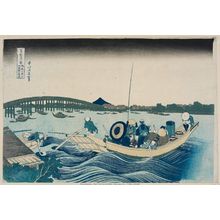
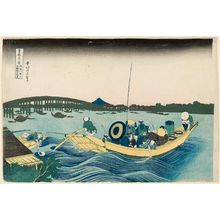
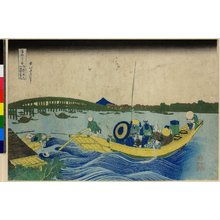
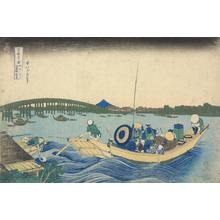
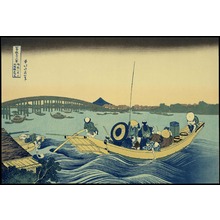
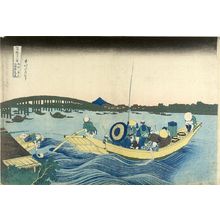
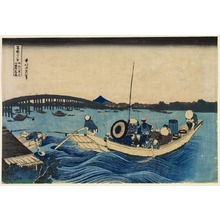
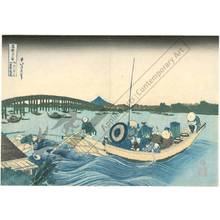
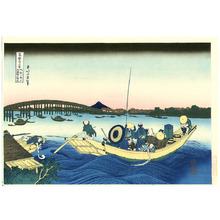
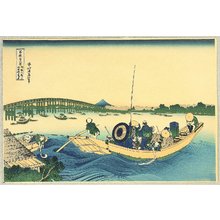
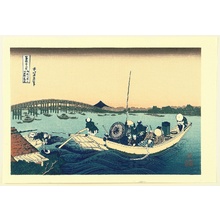
![[Sunset across the Ryōgoku Bridge over the Sumida River at Onmayagashi] Katsushika Hokusai, 葛飾北斎 (Katsushika Hokusai)による浮世絵「[Sunset across the Ryōgoku Bridge over the Sumida River at Onmayagashi]」](https://data.ukiyo-e.org/loc/thumbs/02467v.jpg)
